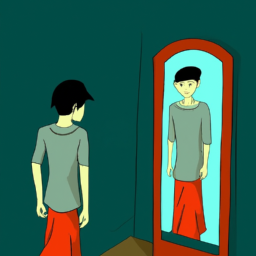Have you ever found yourself in the eerie sensation of being stuck in a lucid nightmare, urgently attempting to rouse yourself but unable to break free? It feels as though you’re ensnared in a whirlwind of fear and doubt, where the boundary between truth and fiction fades into a chilling haze.
I know this feeling all too well, as I have been plagued by vivid bad dreams for as long as I can remember. But why does this happen? What causes these haunting dreams that leave us feeling shaken and disturbed upon waking?
In this article, we will delve into the science of dreams, exploring the role of stress and anxiety, sleep disorders, medication side effects, unresolved trauma, and even our sleep environment. We will also discuss techniques for managing these vivid dreams and when it may be necessary to seek professional help.
So, if you’re tired of being haunted by your nightmares, join me as we unravel the mysteries behind the question, ‘Why am I having vivid bad dreams?’
Key Takeaways
- Vivid bad dreams can be caused by various factors such as stress, anxiety, sleep disorders, medication side effects, and unresolved trauma.
- Relaxation techniques like deep breathing and meditation can help reduce the intensity of vivid dreams caused by stress and anxiety.
- Seeking professional help and exploring treatment options can improve sleep quality and reduce vivid nightmares.
- Substance abuse can disrupt the dream state, negatively affect dream interpretation and quality, and interfere with lucid dreaming.
Top picks for "vivid dream"
Open Amazon search results for this keyword.
As an affiliate, we earn on qualifying purchases.
Understanding the Science of Dreams
You’re probably wondering why you’re having such vivid bad dreams, right? Well, let me explain the science behind it.
Dream interpretation is a complex field that has fascinated scientists and psychologists for centuries. While dreams can be influenced by a variety of factors, one interesting phenomenon is lucid dreaming. This is when you become aware that you are dreaming and can sometimes even control the content of your dreams. Lucid dreaming can lead to more vivid experiences, both good and bad.
When it comes to bad dreams, stress and anxiety play a significant role. During periods of heightened stress, our brains are more likely to produce negative and intense dreams. This is because the amygdala, the part of the brain responsible for processing emotions, becomes more active. As a result, our dreams may reflect our fears, worries, and unresolved issues.
Understanding the science behind dreams can help us gain insight into why we experience such vivid and distressing dreams. By recognizing the role of stress and anxiety in our dream patterns, we can begin to address these issues and find ways to alleviate them.
So, let’s dive into the next section and explore the impact of stress and anxiety on our dream lives.
The Role of Stress and Anxiety
Stress and anxiety can greatly influence the intensity and content of my dreams, often leading to unsettling and detailed experiences during sleep. When I’m stressed or anxious, my mind becomes hyperactive, and this can spill over into my dreams, causing them to become more vivid and intense.
It’s almost as if my brain is trying to process and work through the stress and anxiety while I sleep.
Understanding the role of stress and anxiety in my dreams has allowed me to explore different stress management techniques that can help alleviate the intensity of my dreams. Relaxation techniques, such as deep breathing exercises or meditation, can help calm my mind before bed and reduce the likelihood of having vivid bad dreams.
By incorporating these techniques into my bedtime routine, I’ve noticed a significant improvement in the quality of my sleep and the content of my dreams.
Exploring sleep disorders is the next step in understanding how my dreams are affected by stress and anxiety. By delving deeper into the science behind sleep disorders, I can gain further insight into why I’m having such vivid and unsettling dreams.
Exploring Sleep Disorders
As I delve deeper into the science of sleep disorders, I’m transported to a mysterious realm where my dreams take on a whole new level of complexity and strangeness. Sleep disorders can have a profound impact on the content and intensity of our dreams.
One common type of sleep disorder that can contribute to vivid bad dreams is known as REM sleep behavior disorder (RBD). This disorder occurs when the normal paralysis that typically accompanies REM sleep is absent, causing individuals to physically act out their dreams. This can result in intense and often frightening dream experiences.
In addition to RBD, there are other sleep disorders that can also contribute to vivid nightmares. Sleep apnea, for example, can disrupt the normal sleep cycle, leading to fragmented sleep and an increase in dream recall. Furthermore, insomnia, which is characterized by difficulty falling or staying asleep, can lead to heightened anxiety and stress levels, which in turn can influence the content of our dreams.
Understanding the connection between sleep disorders and vivid bad dreams can be a crucial step in finding relief. By seeking professional help and exploring treatment options, such as therapy or medication, individuals may be able to improve their sleep quality and reduce the occurrence of vivid nightmares.
Transitioning to the next section about medication side effects and dreaming, it’s important to consider how certain medications can impact our dream experiences.
Medication Side Effects and Dreaming
Many medications can affect our dream experiences, with an estimated 20% of people experiencing unusual or vivid dreams as a side effect. It’s important to note that these dreams can vary widely from person to person, and the specific medication being taken can also play a role.
Medications that affect the central nervous system, such as antidepressants, antipsychotics, and certain blood pressure medications, are more likely to impact dream experiences.
One way medications can influence dreams is through interactions with other substances. For example, mixing alcohol with certain medications can increase the likelihood of experiencing vivid or disturbing dreams. Additionally, some medications can enhance the effects of sleep aids or sedatives, leading to more intense dream experiences.
Another factor to consider is the use of lucid dreaming techniques. Some individuals intentionally try to induce lucid dreams, where they are aware that they are dreaming and can control the dream content. Certain medications, particularly those that affect neurotransmitters like serotonin or dopamine, can potentially enhance or inhibit the ability to have lucid dreams.
As we transition into the next section about unresolved trauma and emotional distress, it’s important to recognize that medication side effects are just one piece of the puzzle when it comes to understanding why we may be having vivid bad dreams.
Unresolved Trauma and Emotional Distress
You may find yourself haunted by past traumas or overwhelmed by emotional distress, causing your dreams to be filled with unsettling images and sensations. When unresolved trauma and emotional distress infiltrate our subconscious, they can manifest in vivid and disturbing dreams. Understanding the connection between our waking experiences and our dreamscapes is crucial for navigating the healing process.
-
Healing process: Dealing with unresolved trauma and emotional distress requires a conscious effort to confront and process these experiences. Engaging in therapy or seeking support from loved ones can provide a safe space to explore and heal from past wounds.
-
Coping mechanisms: Developing healthy coping mechanisms is essential for managing the effects of unresolved trauma and emotional distress on our dreams. Engaging in activities such as journaling, mindfulness, or relaxation techniques can help alleviate the intensity of these dreams and promote a sense of emotional well-being.
-
Self-care: Prioritizing self-care is vital when dealing with unsettling dreams. Taking care of our physical and mental health through activities like exercise, a balanced diet, and sufficient sleep can contribute to a more positive dream state.
-
Seek professional help: If vivid and distressing dreams persist and significantly impact your daily life, it may be beneficial to consult a mental health professional. They can provide guidance and support tailored to your specific needs.
By addressing unresolved trauma and emotional distress, we can begin to untangle the intricate web that causes vivid bad dreams. Transitioning into the next section, we will explore the effects of substance abuse on dreaming.
Effects of Substance Abuse on Dreaming
If you’re struggling with substance abuse, the effects can disrupt your dream state and leave you feeling disconnected from your own subconscious experiences. Substance abuse can have a significant impact on dream interpretation and the overall quality of your dreams.
One common effect is the intensification of negative emotions and vivid imagery in dreams. This can lead to experiencing more frequent and distressing nightmares. Substance abuse can also interfere with the ability to have lucid dreaming, which is the awareness that you’re dreaming while still in the dream state. This lack of control over your dreams can further contribute to feelings of helplessness and anxiety upon waking.
The specific substances abused can also play a role in the effects on dreaming. For example, drugs such as marijuana and alcohol can suppress REM sleep, which is the stage of sleep where dreams occur. This can result in a reduction in dream recall and a diminished ability to process emotions during sleep. Additionally, certain substances can alter brain chemistry and disrupt the natural sleep cycle, leading to sleep disturbances and abnormal dreaming patterns.
Understanding the effects of substance abuse on dreaming can help us better comprehend the challenges faced by individuals struggling with addiction. By addressing substance abuse and seeking professional help, it’s possible to improve the quality of sleep and reduce the negative impact on dreams.
Transitioning into the subsequent section about the influence of sleep environment, it’s important to consider how creating a supportive and relaxing sleep environment can positively impact dream experiences.
The Influence of Sleep Environment
Creating a cozy and tranquil sleep environment can greatly enhance the quality of your dreams and promote a more restful night’s sleep. When it comes to sleep hygiene, the bedroom setup plays a crucial role.
Your sleep environment should be clean, comfortable, and free from distractions. Start by choosing a comfortable mattress and pillows that support your body and align your spine. Opt for breathable bedding and keep the temperature cool, as a cooler room temperature promotes better sleep.
Eliminate any sources of noise, such as ticking clocks or outside traffic, as they can disrupt your sleep and potentially affect your dreams. Consider using earplugs or a white noise machine to mask any unwanted sounds. Additionally, make sure your bedroom is dark enough by using blackout curtains or an eye mask to block out any light that may interfere with your sleep.
Organize your bedroom in a way that promotes relaxation and calmness. Keep clutter to a minimum and create a soothing atmosphere with soft lighting, calming scents, and relaxing colors. Consider incorporating elements of nature, such as plants or natural materials, to create a peaceful ambiance.
By prioritizing sleep hygiene and optimizing your bedroom setup, you can create an environment that fosters restful sleep and improves the overall quality of your dreams.
Transitioning into the next section, disrupted sleep patterns can have a significant impact on the content and intensity of your dreams.
Disrupted Sleep Patterns and Dreaming
With disrupted sleep patterns, one may find themselves in a restless slumber, caught in a chaotic whirlwind of fragmented dreams.
1) The irregularity of sleep can have a profound impact on the quality of dreams experienced. When sleep patterns are disrupted, the brain struggles to go through the usual stages of sleep, leading to an imbalance in REM (rapid eye movement) sleep and non-REM sleep. This imbalance can result in vivid and intense dreams that may feel unsettling or even nightmarish.
2) Disrupted sleep can also lead to increased brain activity during sleep, causing the mind to process and replay stressful or traumatic events more frequently. This heightened activity can contribute to the intensity and vividness of dreams.
3) Additionally, when sleep patterns are inconsistent, it can be more difficult for the mind to enter a deep and restorative sleep. This can leave one feeling emotionally and psychologically drained, making dreams feel more vivid and unsettling.
4) Furthermore, disrupted sleep patterns can disrupt the body’s natural circadian rhythm, creating a sense of confusion and disorientation that can manifest in dreams.
Transitioning into the subsequent section about ‘techniques for managing vivid dreams,’ understanding the impact of disrupted sleep patterns on dreaming is crucial in finding effective strategies to alleviate the intensity of these experiences.
Techniques for Managing Vivid Dreams
Take control of your restless nights and discover effective techniques to manage and alleviate the intensity of those vivid and unsettling dreams. One technique that can help is lucid dreaming, which involves becoming aware that you are dreaming while still in the midst of the dream. By learning to recognize when you are dreaming, you can take control of the dream and steer it in a more positive direction. Another helpful tool is keeping a dream journal. By writing down your dreams as soon as you wake up, you can gain insight into recurring themes or patterns that may be causing your nightmares. This can also help you identify any underlying stressors or anxieties that may be contributing to the vividness of your dreams.
To convey a deeper meaning for the audience, consider the following table:
| Technique | Description |
|---|---|
| Lucid Dreaming | Becoming aware that you are dreaming and taking control of the dream |
| Dream Journal | Writing down your dreams to gain insight into recurring themes and underlying stressors or anxieties |
By incorporating these techniques into your nightly routine, you can better manage your vivid dreams and reduce their intensity. However, if your bad dreams persist or significantly impact your quality of life, it may be time to seek professional help.
When to Seek Professional Help
If your dreams continue to disturb your sleep and negatively impact your daily life, it might be time to consider seeking professional help. Early intervention is crucial in addressing any underlying issues that may be causing these vivid bad dreams.
While it’s normal to have occasional nightmares, differentiating between normal dreams and nightmares can help determine when professional help is needed. Nightmares are intense, distressing dreams that often wake you up feeling frightened or anxious. They can be caused by a variety of factors, including stress, trauma, medications, or sleep disorders.
However, if these vivid bad dreams persist and disrupt your sleep on a regular basis, it’s important to consult a healthcare professional. A mental health professional can help identify any underlying psychological or emotional issues that may be contributing to these nightmares. They can provide guidance and support in developing coping strategies and exploring potential treatment options. This may involve techniques such as cognitive-behavioral therapy, relaxation exercises, or medication management.
Remember, seeking professional help isn’t a sign of weakness, but rather a proactive step towards improving your well-being. By addressing these vivid bad dreams early on, you can regain control over your sleep and restore balance to your daily life.
Frequently Asked Questions
How can lucid dreaming be used to overcome vivid bad dreams?
Lucid dreaming is an incredible tool for overcoming nightmares and taking control of dream content. By practicing lucid dreaming, I can harness the power of my subconscious mind to transform frightening scenarios into empowering experiences.
Visualizing symbols that represent strength and safety allows me to confront and conquer my fears within the dream world. With this newfound control, I can turn my vivid bad dreams into opportunities for growth and self-empowerment.
Can certain foods or dietary habits affect the frequency or intensity of vivid bad dreams?
Certain foods and dietary habits can indeed affect the frequency and intensity of vivid bad dreams. Consuming heavy or spicy meals close to bedtime can increase the chances of experiencing nightmares. Similarly, consuming alcohol or caffeine before sleep can disrupt the sleep cycle and lead to more intense dreams.
Additionally, irregular eating patterns or a diet lacking in essential nutrients can also impact the quality of sleep and contribute to vivid bad dreams. It’s important to maintain a balanced diet and avoid stimulating foods before bedtime to promote a better night’s sleep.
Are there any natural remedies or alternative therapies that can help reduce the occurrence of vivid bad dreams?
There are several natural supplements that may help reduce the occurrence of vivid bad dreams. Valerian root is often used for its calming effects and can promote more restful sleep.
Another option is melatonin, which can regulate sleep patterns and improve sleep quality.
Additionally, keeping a dream journal can be beneficial in identifying patterns or triggers for vivid dreams. By recording your dreams, you may gain insight into their meaning and find ways to reduce their occurrence.
Can practicing relaxation techniques, such as meditation or deep breathing, before bed help alleviate vivid bad dreams?
Practicing relaxation techniques, like meditation or deep breathing, before bed can help alleviate vivid bad dreams. These techniques help to calm the mind and reduce stress, which can be a major contributor to the occurrence of vivid bad dreams.
Additionally, sleep disorders, such as sleep apnea or insomnia, can also play a role in causing these dreams. By incorporating relaxation techniques into your bedtime routine, you may experience a decrease in the frequency and intensity of your vivid bad dreams.
What impact does exercise have on the occurrence of vivid bad dreams?
Lack of exercise can contribute to the occurrence of vivid bad dreams. Regular exercise, on the other hand, can help reduce their frequency.
When we don’t exercise, our bodies may have an excess of energy that needs to be released, which can manifest in our dreams. Regular exercise not only helps to balance our energy levels but also promotes better sleep, leading to fewer vivid dreams.
So, incorporating exercise into your routine might just be the solution you’re looking for.
Conclusion
In conclusion, it’s important to recognize that vivid bad dreams can be caused by various factors. These factors include stress, sleep disorders, medication side effects, unresolved trauma, and disrupted sleep patterns. While these dreams can be distressing, there are techniques available to help manage them.
Whether it’s creating a soothing sleep environment, practicing relaxation techniques, or seeking professional help, there is hope for finding relief. Remember, dreams are like windows into our subconscious. By understanding and addressing the underlying issues, we can work towards a more peaceful night’s sleep.
As the saying goes, "Every dream is a journey, but it’s up to us to navigate the path."









